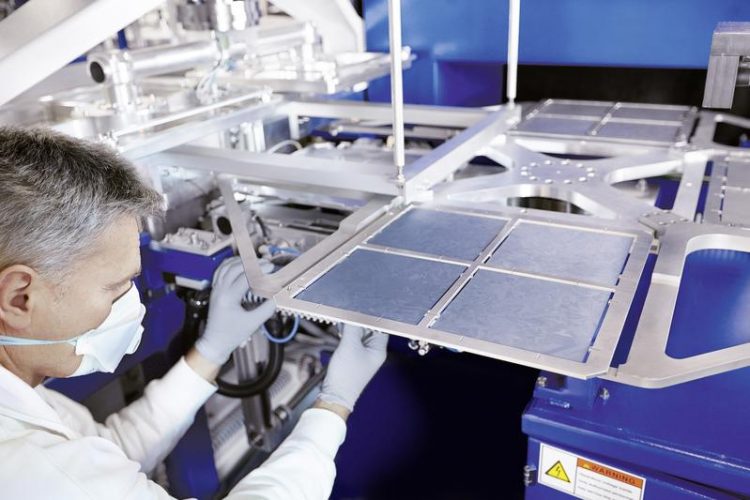With new contacting to greater efficiency

Scientists are investigating how they can increase the efficiency of solar cells and reduce internal losses. © Singulus Technologies AG
Monocrystalline silicon solar cell achieves 25.7% efficiency
In order to reduce efficiency losses, free charge carriers need to be transferred as loss-free as possible and their recombination avoided. The scientists have achieved this, among other things, by using new, full-area selective and passivating contacting on the back side of the solar cells.
This contacting consists of an ultra-thin tunnel oxide and a silicon layer that is only one to two nanometres thick. The new contact transports the charge carriers with virtually no losses and prevents the charge carriers from recombining at the metal contacts.
The greater the proportion of incident solar radiation that the solar cell can convert into electrical energy, the greater the efficiency. Structures on the micro- or nanometre scale help solar cells capture the light and make optimum use of it.
The scientists have developed corresponding texture combinations for the front and back side of solar cells that improve the light coupling.
The research work in the “ForTES” project was led by the Fraunhofer Institute for Solar Energy Systems.
You found all informations about the BINE Projectinfo brochure entitled “New method comes closer to the ideal solar cell” here:
http://www.bine.info/en/press/press-releases/press/pressemitteilung/mit-neuer-ko…
Uwe Milles/Birgit Schneider
presse(at)bine.info
About BINE Information Service
Energy research for practical applications
The BINE Information Service reports on energy research topics, such as new materials, systems and components, as well as innovative concepts and methods. The knowledge gained is incorporated into the implementation of new technologies in practice, because first-rate information provides a basis for pioneering decisions, whether in the planning of energy-optimised buildings, increasing the efficiency of industrial processes, or integrating renewable energy sources into existing systems.
About FIZ Karlsruhe
FIZ Karlsruhe – Leibniz Institute for Information Infrastructure is a not-for-profit organization with the public mission to make sci-tech information from all over the world publicly available and to provide related services in order to support the national and international transfer of knowledge and the promotion of innovation.
Our business areas:
• STN International – the world’s leading online service for research and patent information in science and technology
• KnowEsis – innovative eScience solutions to support the process of research in all its stages, and throughout all scientific disciplines
• Databases and Information Services – Databases and science portals in mathematics, computer science, crystallography, chemistry, and energy technology
FIZ Karlsruhe is a member of the Leibniz Association (WGL) which consists of 87 German research and infrastructure institutions.
http://www.bine.info/en – BINE Informationsdienst
Media Contact
All latest news from the category: Power and Electrical Engineering
This topic covers issues related to energy generation, conversion, transportation and consumption and how the industry is addressing the challenge of energy efficiency in general.
innovations-report provides in-depth and informative reports and articles on subjects ranging from wind energy, fuel cell technology, solar energy, geothermal energy, petroleum, gas, nuclear engineering, alternative energy and energy efficiency to fusion, hydrogen and superconductor technologies.
Newest articles

After 25 years, researchers uncover genetic cause of rare neurological disease
Some families call it a trial of faith. Others just call it a curse. The progressive neurological disease known as spinocerebellar ataxia 4 (SCA4) is a rare condition, but its…

Lower dose of mpox vaccine is safe
… and generates six-week antibody response equivalent to standard regimen. Study highlights need for defined markers of mpox immunity to inform public health use. A dose-sparing intradermal mpox vaccination regimen…

Efficient, sustainable and cost-effective hybrid energy storage system for modern power grids
EU project HyFlow: Over three years of research, the consortium of the EU project HyFlow has successfully developed a highly efficient, sustainable, and cost-effective hybrid energy storage system (HESS) that…





















